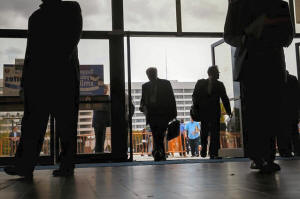|
U.S. job gains in May likely dented by
Verizon strike
 Send a link to a friend
Send a link to a friend
 [June 03, 2016]
By Lucia Mutikani [June 03, 2016]
By Lucia Mutikani
WASHINGTON (Reuters) - A strike by Verizon
workers likely crimped U.S. job gains in May, but employment growth
should still be strong enough to confirm a tightening labor market and
push the Federal Reserve closer to raising interest rates soon.
Nonfarm payrolls probably increased by 164,000 jobs in May after
rising by 160,000 in April, according to a Reuters survey of
economists ahead of Friday's closely watched employment report. The
jobless rate is forecast slipping one-tenth of a percentage point to
4.9 percent.
A government report last week suggested a month-long strike by
Verizon workers could slice 35,100 jobs from payrolls in May. The
striking workers, who returned to their jobs on Wednesday, were
regarded as unemployed because they did not receive a salary during
the payrolls survey week.
Without the strike, employment would probably have risen by about
200,000 jobs, matching the monthly average for the first quarter.
Economists and Fed Chair Janet Yellen say monthly gains of roughly
100,000 jobs are needed to keep up with growth in the work-age
population.
The Labor Department is scheduled to release the jobs data at 8:30
a.m. EDT (1230 GMT). It will likely confirm the economy has bounced
back after growth almost stalled at the start of the year.
 "As long as the report is essentially in line with April or better,
we think it will support the Fed's outlook for a 25-basis-point rate
hike in June or July," said Terry Sheehan, a senior analyst at Stone
& McCarthy in Princeton, New Jersey.
The U.S. central bank has signaled its intention to raise rates soon
if job gains continue and economic data remain consistent with a
pickup in growth in the second quarter.
Yellen said last week that a rate increase would probably be
appropriate in the "coming months," if those conditions were met.
Data on consumer spending, industrial production, goods exports and
housing have suggested the economy is gathering speed after growth
slowed to a 0.8 percent annualized rate in the first quarter.
Financial markets see a small chance of a rate increase at the Fed's
June 14-15 policy meeting, but are pricing in a roughly 59 percent
probability at the July gathering, according to CME Group's FedWatch
program. The Fed hiked its benchmark overnight interest rate in
December for the first time in nearly a decade.
MODEST WAGE GROWTH
Despite a tightening labor market, there is still no sign of
meaningful wage growth. Average hourly earnings are forecast rising
0.2 percent in May after gaining 0.3 percent in April. That would
keep the year-on-year rise at 2.5 percent.
"There is more shadow slack given the absence of a noticeable
acceleration in wage growth," said Ryan Sweet, senior economist at
Moody's Analytics in Westchester, Pennsylvania.
[to top of second column] |

People enter the Nassau County Mega Job Fair at Nassau Veterans
Memorial Coliseum in Uniondale, New York October 7, 2014.
REUTERS/Shannon Stapleton

Economists say wage growth of between 3.0 percent and 3.5 percent is
needed to lift inflation to the Fed's 2.0 percent target. There are,
however, signs that inflation is creeping higher as the dampening
effects of the dollar's past rally and the oil price plunge
dissipate.
Other measures of labor market slack, including the number of
Americans working part-time for economic reasons, will be watched
for clues on how soon the job market will hit full employment.
A broad measure of unemployment that includes people who want to
work but have given up searching and those working part-time because
they cannot find full-time employment is currently at an eight-year
low.
Job gains in May were likely broad-based, although mining employment
probably maintained its downward trend. Mining payrolls have dropped
by 191,000 since peaking in September 2014, with three-quarters of
the losses in support activities.
Manufacturing employment is expected to have slipped by 1,000 jobs
after increasing by 4,000 in April. The Verizon labor dispute
probably reduced information sector jobs by 35,100.
Retail payrolls likely rebounded after shedding jobs in April for
the first time since December 2014. An improvement is also expected
in temporary help jobs, which have weakened since January.
(Reporting by Lucia Mutikani; Editing by Paul Simao)
[© 2016 Thomson Reuters. All rights
reserved.]
Copyright 2016 Reuters. All rights reserved. This material may not be published,
broadcast, rewritten or redistributed.
 |